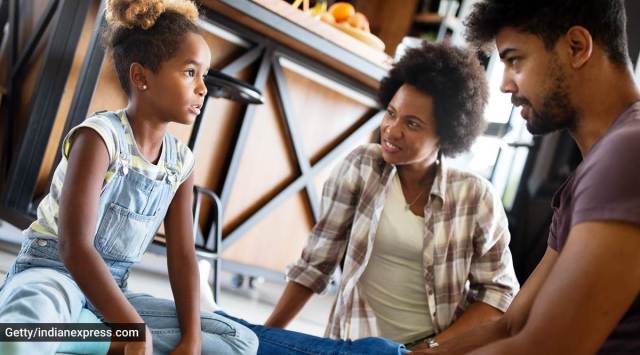- India
- International
Matters of the mind: Time for tough talk
Respect children's choices when they say “no” to be touched or kissed, giving them a message that choices must be regarded
 We must help children identify abusive words, and unless you tell them the meaning of these, they will either find out too late or from an external, unreliable uncensored resource like the web. (Photo: Getty Images/Thinkstock)
We must help children identify abusive words, and unless you tell them the meaning of these, they will either find out too late or from an external, unreliable uncensored resource like the web. (Photo: Getty Images/Thinkstock)I remember being comfortably settled in my seat on my way to Dubai to bring in the New Year with friends that year when I picked up the newspaper to read about Nirbhaya. The time allowed me to read every single detail of the case, and that day at that distinct hour, something inside me as a woman died.
Time and time again that unsettling feeling gets triggered when ghastly news of rape, assault, unimaginable and inhumane actions get reported. I am certain that I am not alone in feeling that the Hathras case opened up some of those wounds and worries for you too. Why such devastating and irreparable exploitation of basic human respect and life? Feeling unsettled is not enough. It will take months, investigations, elaborate policies, versions and verdicts before we see justice and a glimmer of light on this front.
I would like to focus on what we can do to help and address this at a micro-level. I believe we can start at home. Availability of social media, information technology, rising frustrations and inhibited conversations in the house have started to expose children to words like rape, sexual assault, violence and exploitation. This may not be intentional, but it can be used with intention.
ALSO READ | Matters of the Mind: When things go south
I have always believed that parents can be the most gentle and authentic sources of information for children. We can expose, guide and teach the future generations more than about grades in school, making it to Ivy League colleges and earning sizeable packages annually. Maybe this is a wake-up call for us parents to consider tough-talking, start at the grassroots level and instil a value system in children, teens and young adults to change collective attitudes.

This is probably one of the most terrifying conversations for parents, and thus there is a significant need for empathetic conversations and hand-holding each other as a community of caregivers to be effective guides for our children. Dread, anxiety and apprehension on our part are understandable but preparedness and prevention are rooted in information and teaching.
This is a discussion not just for daughters. Sons are violated too. Another aspect to think about is whether our children are victims or perpetrators, they are unsafe and need direction.
According to the NCRB report from 2016, a total of 2.90 lakh people went missing, of which 1.74 lakh were females, marking missing males at 1.16 lakh. There is a rape every 16 minutes in India. Statistically, 43 per cent of victims in India are minors, 5 per cent being under the age of 12.
It is reason enough for us to stop living with the delusion that “it won’t happen to us” and the impaired mentality that only girls are vulnerable. We believe we are at a safe distance when in most cases perpetrators are known to victims, are family members or friends of the family that have access to our children well under our noses.
ALSO READ | Matters of the Mind: Self-discipline is a necessary tool to overcome crisis
Or are we just uncomfortable talking about unpleasant realities and bypass talking about a crucial danger that lurks closer than we think? As parents, it’s time we put away our fantasies, hesitations, reservations and gently yet assertively talk to our children about the concepts of rights, consent and abuse. Please know that only educating will give our children tools to act before it’s late, to prevent hurt, to preserve rights and liberty.
Start talking early about consent and choices. It is important to introduce the idea of consent to both boys and girls. Consistent conversations about good touch and bad touch, reminders to respect the words “no” “don’t” and “stop” and regard for privacy, physical and emotional is a crucial conversation to have. We need to follow these rules.
Posting pictures of children without their consent, talking about incidences that parents find funny about children’s bodies, sharing anecdotes that are private in nature with friends and family without their consent is giving them a message. Soon such conversations become a part of their chat groups and locker room digs aimed at other kids.
 Time to be a smart and considerate parent. (Source: Getty Images/Thinkstock)
Time to be a smart and considerate parent. (Source: Getty Images/Thinkstock)
Respect children’s choices when they say “no” to be touched or kissed, giving them a message that choices must be regarded.
In case of a violation, be prompt to address. We need to take actions that are educational, not punitive. Most often, children are not able to foresee what their actions and words can lead to. Ask them to think, encourage them to talk to you and take restorative action, repair the damage done, apologise and take responsibility.
Teens and young adults
By this age, the focus on “consent” should already be instilled and valued. Various “touch games” like boys hitting one another in the genitals and pinching each others’ nipples, girls lifting each other’s skirts or butt-slapping emerge as frolic. We must talk about how these games impact other people and introduce the concept of empathy and discomfort, that a violation is never funny. This isn’t “boys being boys”, or “girls bullying girls”, this is harassment, and sometimes if not checked can cause significant physical and emotional trauma to both.
Remind them consistently about personal choices, body, private parts, sex and sexuality. Ask questions like, “How do you know whether your partner is ready to kiss you?” and “How do you think you can tell if a girl (or boy) is interested in you?” “What do you do if your partner says no?” About taking permission to kiss or touch a partner, and how to cope with disappointment or rejection of their offer. This is a great time to explain enthusiastic consent. Explain that only “yes” means “yes.” Don’t wait for your partner to say “no” to look for consent.
ALSO READ | Talking about consent with young boys
Gender segregated environments often encourage trash talk. Children at sleepovers, locker rooms, swimming pool changing rooms indulge in a lot of conversation that is private in nature. I can assure you, several are doing so without even understanding the meaning of the words used.
We must help children identify abusive words, and unless you tell them the meaning of these, they will either find out too late or from an external, unreliable uncensored resource like the web.
Tell your kids that no matter what the topic or feeling about it, they can come to sound it off with you. These will give us the opportunities to instil values and attitudes of respect and equality, that words can be abusive too, and that practice of kindness and empathy are the biggest signs of growing up.
Redefine masculinity
We need to talk to boys and girls about what masculinity means. Challenge some of the sloppy ideas of masculinity and its tilted expression, communicate what you respect about masculinity and the idea of it being far from equal to violence, aggression and a show of strength.
This is probably one of the most important discussions to bring about any change in the minds of our future generations.
ALSO READ | How to talk to kids about sex and sexuality
Talk about boundaries at trips, parties, when there is no adult supervision
“We were just having fun” can often get out of hand. It is imperative to inform and prepare children in no uncertain terms about things that can go wrong with drinking, drugs, spiked drinks, being alone in a room, in a car park, date rape, a drunk partner or friend or someone who is making unnecessary, unwanted advances at them. Remind them about boundaries and consent, even if in a serious relationship. Prepare kids with options of finding safe ground in case something were to go wrong. This also implies introducing the idea of not being a bystander and calling for help for a friend they might see in trouble.
 Conversations about permission and privacy need to be consistent. (Source: Getty Images/Thinkstock)
Conversations about permission and privacy need to be consistent. (Source: Getty Images/Thinkstock)
Conversations about permission and privacy need to be consistent, even if our kids roll their big eyes saying “Not again!” They need to develop auditory memory, an inner voice that reminds them of boundaries and respect, consent and caution and thus, parents, please persist!
Not only will this benefit them, but if this ideology becomes the new hit conversation, a new cool trend, the new peer pressure, to be respectful and regard consent, we may have some hope of changing the world our children are living in.
(The author is a Mumbai-based psychologist and psychotherapist)
Apr 26: Latest News
- 01
- 02
- 03
- 04
- 05




































